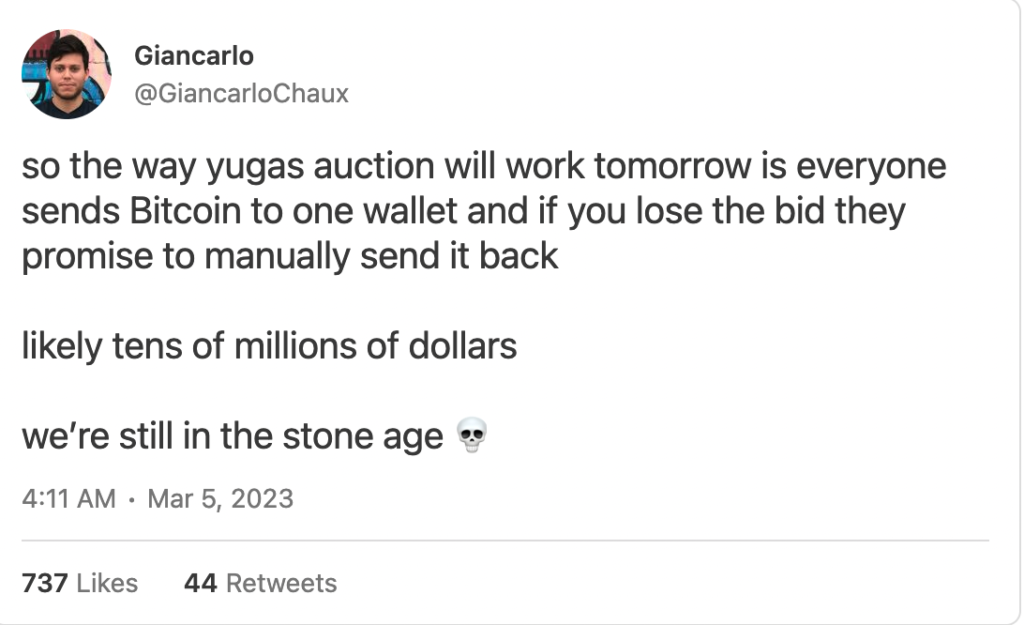Yuga Labs receives backlash

Yuga Labs, the firm behind the Bored Ape Yacht Club (BAYC) NFTs, launched its first 300-piece Bitcoin NFT collection, TwelveFold, on Monday. The current auction process for Bitcoin NFTs has garnered criticism from some users, including the inventor of Bitcoin Ordinals, Casey Rodamor, who has threatened to cut all ties with Yuga Labs and encourage others to do the same if they perform “degenerate bullshit like this again.” This backlash has sparked a debate on the feasibility of Bitcoin’s limited smart contract ability to accommodate NFT auctions and sales. This editorial will provide an in-depth analysis of the current auction process for Bitcoin-based NFTs and examine the criticism against Yuga Labs.

Unlike Ethereum-based NFTs, buying artworks built on the premier crypto network doesn’t have an open marketplace. Thus, the current auction process requires interested TwelveFold buyers to transfer Bitcoin to a Yuga Labs deposit address to place their bids.
Bad precident
The company then places the users’ Bitcoin into custody until the auction ends, and if a bid is unsuccessful, the funds are returned. However, the criticism here revolves around other projects running a similar process but making off with users’ money instead of returning it to unsuccessful bids. As one of the most recognizable NFT brands, Yuga Labs “need to set a better example,” according to a Bitcoin Ordinals user


Bitcoin’s limited smart contract ability prohibits developers, even the likes of Yuga Labs, from setting up similar mechanisms on Bitcoin. On Ethereum, for example, you can place on-chain bids on top Ethereum marketplaces like OpenSea and Blur for NFT auctions and sales, a feature currently unavailable on Bitcoin. Given the stark criticism from users, continued Bitcoin NFT adoption appears to hinge on solving this primitive auction mechanism.
The current Yuga Labs auction model entails bidders sending their bid amount in BTC to an address under Yuga Labs. After the bidding, the winners will pay the amount they bid, while the firm will return the BTC of those who didn’t win. However, this process has not been acceptable to the community. Many pointed out that such a process of returning BTC to those who failed manually is inappropriate. Giancarlo, a community member, criticized the Yuga Labs model, asking if they’re still in the Stone Age. Another notable tweet from an Ordinals-focused Twitter account referred to the process as a “scammers dream.” According to Ordinals, Yuga Labs is setting a bad precedent by holding bidders’ BTC and refunding it after the auction, and scammers will capitalize on this process to steal users’ BTC.
Furthermore, the Bitcoin Ordinals creator, Casey Rodarmor, shared a response also criticizing the Yuga Labs model, stating that the firm is “f*cking around with degenerate bullshit.” Rodarmor further warned that if Yuga Labs ever conducts such an auction again, he will wash his hands off the project and encourage others to do the same.
Many others, such as Ryan Kia, also pointed out the shortcomings of the auction model. Kia stated that the process would make more money for Yuga Labs but would not favor the crypto community. Amid the criticisms, some people also pointed out the good points of Yuga Labs’ step. Ordinals commended the NFT hub for its effort to use BTC in its auction payment but lamented that using Bitcoin to set such a bad precedent is not good.

The backlash Yuga Labs has been receiving for its push into the Bitcoin NFT market has sparked a debate on the feasibility of Bitcoin’s limited smart contract ability to accommodate NFT auctions and sales. While Ethereum-based NFTs have an open marketplace that allows placing on-chain bids on top Ethereum marketplaces like OpenSea and Blur for NFTs, Bitcoin’s smart contract capabilities are limited, and this is causing some issues for the industry.
However, some experts argue that Bitcoin’s limited smart contract functionality can be viewed as a strength, not a weakness. Bitcoin’s simplicity and security make it an attractive option for collectors who want to own unique and valuable digital assets without worrying about complex code or potential security vulnerabilities.
Ultimately, the future of NFTs on Bitcoin is still uncertain. While some may argue that the lack of functionality and marketplaces for Bitcoin-based NFTs will limit their growth, others see it as an opportunity for innovation and creativity. It’s clear that there is a demand for digital collectibles, and as the NFT market continues to grow and evolve, we can expect to see new solutions and technologies emerge to address the challenges and limitations of different blockchain platforms.
In any case, it’s important for buyers and sellers to do their research and carefully consider the benefits and risks of different blockchain platforms before participating in the NFT market. As with any new and rapidly evolving industry, there are likely to be challenges and uncertainties along the way, but with careful planning and collaboration, the potential for growth and success is significant.

Thanks for reading Solanews, stay tuned to our social media channels for more!

